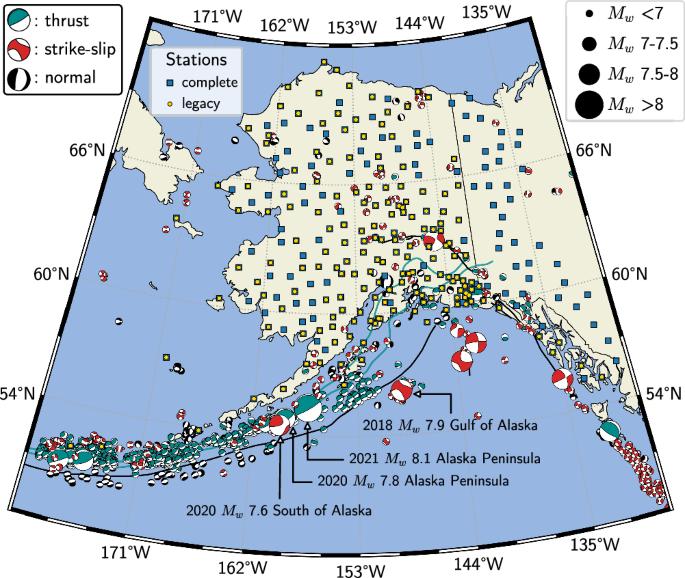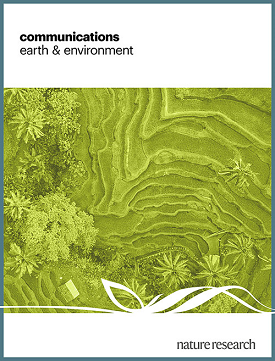Fast and full characterization of large earthquakes from prompt elastogravity signals
IF 8.1
1区 地球科学
Q1 ENVIRONMENTAL SCIENCES
引用次数: 0
Abstract
Prompt ElastoGravity Signals are light-speed gravity-induced signals recorded before the arrival of seismic waves. They have raised interest for early warning applications but their weak amplitudes close to the background seismic noise have questioned their actual potential for operational use. A deep-learning model has recently demonstrated its ability to mitigate this noise limitation and to provide in near real-time the earthquake magnitude (Mw). However, this approach was efficient only for large earthquakes (Mw ≥ 8.3) of known focal mechanism. Here we show unprecedented performance in full earthquake characterization using the dense broadband seismic network deployed in Alaska and Western Canada. Our deep-learning model provides accurate magnitude and focal mechanism estimates of Mw ≥ 7.8 earthquakes, 2 minutes after origin time (hence the tsunamigenic potential). Our results represent a major step towards the routine use of prompt elastogravity signals in operational warning systems, and demonstrate its potential for tsunami warning in densely-instrumented areas. A deep-learning model can estimate the magnitude and focal mechanism of large earthquakes in near-real time using light-speed gravity-induced signals recorded by seismometers before the arrival of seismic waves, advancing tsunami warning systems.

从即时弹性重力信号中快速全面地确定大地震的特征。
即时重力信号(Prompt ElastoGravity Signals)是在地震波到来之前记录的光速重力感应信号。它们在预警方面的应用引起了人们的兴趣,但其接近地震背景噪声的微弱振幅使人们对其实际应用潜力产生了质疑。最近,一个深度学习模型证明了它有能力减轻这种噪声限制,并近乎实时地提供地震震级(M w)。然而,这种方法仅对已知焦点机制的大地震(M w ≥ 8.3)有效。在这里,我们利用部署在阿拉斯加和加拿大西部的密集宽带地震网络,展示了前所未有的全面地震特征描述性能。我们的深度学习模型可在发震时间 2 分钟后对 M w ≥ 7.8 的地震提供准确的震级和震源机制估计(因此具有海啸潜力)。我们的研究结果标志着向在业务预警系统中常规使用即时弹性重力信号迈出了重要一步,并证明了其在仪器密集地区进行海啸预警的潜力。
本文章由计算机程序翻译,如有差异,请以英文原文为准。
求助全文
约1分钟内获得全文
求助全文
来源期刊

Communications Earth & Environment
Earth and Planetary Sciences-General Earth and Planetary Sciences
CiteScore
8.60
自引率
2.50%
发文量
269
审稿时长
26 weeks
期刊介绍:
Communications Earth & Environment is an open access journal from Nature Portfolio publishing high-quality research, reviews and commentary in all areas of the Earth, environmental and planetary sciences. Research papers published by the journal represent significant advances that bring new insight to a specialized area in Earth science, planetary science or environmental science.
Communications Earth & Environment has a 2-year impact factor of 7.9 (2022 Journal Citation Reports®). Articles published in the journal in 2022 were downloaded 1,412,858 times. Median time from submission to the first editorial decision is 8 days.
 求助内容:
求助内容: 应助结果提醒方式:
应助结果提醒方式:


